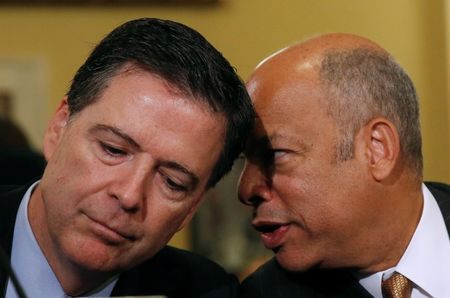By Doina Chiacu
WASHINGTON (Reuters) - Americans radicalized by online propaganda from Islamic State and other militant groups pose the main terrorist threat to the United States, which is especially vulnerable to foreign fighters returning from Syria, senior U.S. security officials said on Wednesday.
While there is no evidence that the radical Islamist group plans an attack on U.S. soil, its vigorous propaganda machine and sophisticated online recruitment efforts created a clear potential threat, they said.
The heads of the Federal Bureau of Investigation, Homeland Security and the National Counter terrorism Center issued the warning in a hearing before the House Homeland Security Committee.
They spoke as the U.S. military prepared to expand U.S.-led military action against Islamic State from Iraq to Syria, and before a House of Representatives vote on President Barack Obama's request to arm Syrian rebels to fight the militants.
Homeland Security Secretary Jeh Johnson said Islamic State was committed to attacking Americans just because they were Americans, as shown in videos it released in recent weeks of the beheadings of journalists James Foley and Steven Sotloff.
The group's threat lies in its online attempts to radicalize Americans and its efforts to recruit from 2,000 Westerners who have traveled to Syria to fight President Bashar al-Assad's government, the officials said.
The foreign fighters, who included 100 Americans, "may eventually return to their home countries battle-hardened, radicalized and determined to attack us," said Matt Olsen, the leading U.S. counter terrorism official.
He said Syria remained a key training ground for independent or al Qaeda-aligned groups, and that the rate of travelers going to Syria exceeded that of those who went to Afghanistan, Pakistan, Iraq, Yemen or Somalia in the last 10 years.
Lawmakers pressed the administration officials on how they can prevent attacks by so-called homegrown violent extremists or Syria foreign fighters who may carry U.S. or European passports.
The officials cited the arrest of a Rochester, New York, man announced on Tuesday, on charges of trying to provide material support to Islamic State and attempting to murder U.S. soldiers.
FBI Director James Comey acknowledged the difficulties of countering the homegrown threat. "In a country this big and this free, with the material that is available, it's a big challenge," he said.
The administration officials outlined threats from militant groups around the world, including al Qaeda offshoots, and said they continued to focus on airline security to counter a primary threat.
Olsen singled out Al Qaeda in the Arabian Peninsula, which was behind three attempted airline bombings, including the 2009 underwear bomber in Detroit, as the al Qaeda splinter group most likely to attempt an attack inside the United States.
But Olsen said "homegrown violent extremists remain the most likely immediate threat to the homeland."
Johnson identified such "lone wolf" attackers as the hardest to detect and said his agency was working with communities to identify people vulnerable to recruitment by extremist groups through online propaganda.
"This boundless virtual environment, combined with terrorists' increasingly sophisticated use of social media, makes it increasingly difficult to protect our youth from propaganda," Olsen said.

"This online environment is likely to play a critical role in the foreseeable future in radicalizing and mobilizing (them) towards violence," he said.
(Editing by Jonathan Oatis)
